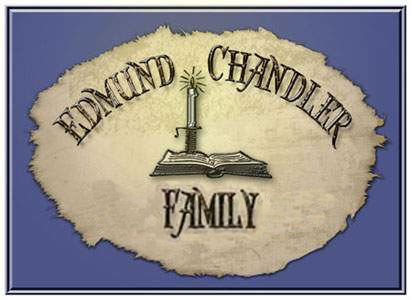
CFA Chapter 13
|
Chapter 13 home page |
The Edmund Chandler Sugar Plantation Myth
by Carol May, Reserach Director, Group 13
Last updated May 8, 2014
One of the persistent myths about Edmund Chandler, and there are many, is that he owned a sugar plantation in 1625 before he came to Plymouth. There are old books and stories on the Internet that perpetuate this. There were no colonists, nor was there sugar in the Barbados in 1625.
Barbados wasnt settled until 1627 according to the Barbados Department of Archives. Captain Henry Powell brought a group of colonists from England that year. After trying to grow other crops, sugar was tried. Small plots gave way to large plantations as time went on.
Edmund Chandler appeared in records in Leiden, Holland in 1613, when he was admitted for citizenship. He appeared again in Leiden records in 1615, 1619, 1623, and 1626. On July 31, 1628 he witnessed the Will of Catherine Edmonds, wife of William Cubitt. This document is also in the Leiden archives. The year that he arrived in Plymouth is not known, nor is the name of the ship on which he sailed. However, he was first recorded as a freeman in 1633 in Plymouth. At that time church membership was a requirement to be admitted as a freeman, according to The Genealogy of Edward Small, by Lora Altine Woodbury Underhill.
However, all myths start somewhere. Edmund died between May 2, 1662 when he made his Will and June 2, 1662 when the inventory of his estate was taken. His Will was proved June 4, 1662 (Plymouth Colony Probate, Book 2: pt. 2: 75, 76 as referred to in Small, see above) When he died, he bequeathed to his daughters, Sarah, Anna, and Mary three thousand and five hundred of sugar which belonges to mee at Barbadoes. Only the sugar was said to have been in Barbados, not the daughters also, as some have asserted.
Edmund could have acquired the sugar in trade as sugar was used as money, or it could have something to do with his son John, who died about 10 years prior to his fathers death. Johns Will is in the Barbados archives and was proved July 11, 1653. We have a letter from the Barbados clerk in our archives that states that John was a planter, but that statement, which was erroneous, was later retracted in a subsequent letter from the Barbados. He probably died at sea as his Will was written shipboard. This is an abstracted version of his Will from the Barbados archives:
All my estate to Edmund Chandler my father, living at New Plimouth (sic) in New England, if father is dead to my brothers and sisters. Father to be Executor. Goods in ship Seaflower, Capt. Miles Canaton Commander; friend Lt. John Dixon is to see that goods get to father, brothers or sisters.
We do not know if Edmund had any other relatives go to Barbados. We havent found documentation. It has been asserted that Edmunds grandson, John, who lost his hand, went to Barbados. However, he was still not of age in 1687 when the Town of Duxbury, Massachusetts gave him 50 Acres of Land Provided that his Father shall have liberty to sell or other wise improve sd Lands for the benefit of the afore sd child (Town Records of Duxbury, (original) vol. 5:6 as referred to in Small, see above), so if he did go it would have had to have been after that.
From the Chronicle Barbados, Centre for Barbados Studies in History and Genealogy web site, four people named Chandler were found in Barbados records from 1630-1680, although the records are not complete. They were John Channdler, a servant from Bristol, Giles Chandler a servant who also sailed from Bristol. Richard Chandler, no further information given about his origins. Finally, Nicho. (Nicholas?) Chandler, who was listed as an owner of land or possessing hired servants. No further information given about his origins.
If anyone has any documented information about the sugar or any Chandler family connection to Barbados, let us know.



